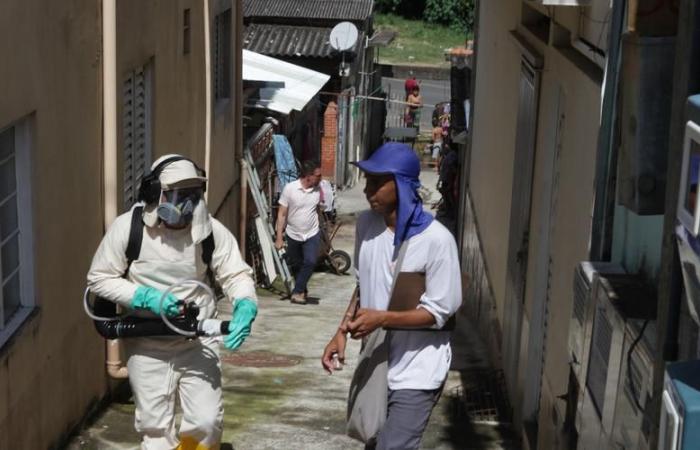Campinas surpassed the 2015 dengue cases on Friday (26) and reached the worst epidemic since 1998, the beginning of the historical series. In less than four months, the city recorded 65,808 cases compared to 65,754 in the whole of 2015. The data comes from the Arbovirus Monitoring Panel. from the Municipal Health Department, which provides all data on the disease, such as incidence, patient profile, hospitalization rate and others. The number of deaths, however, is still lower. In 2015, 22 people died from the disease transmitted by the Aedes aegypti mosquito, compared to 14 from January 1st to Friday (26th). Throughout the historical series, 2014 was another year that stood out due to the high rate of occurrences. There were 43,413 cases and 10 deaths.
Climatic conditions favorable to high temperatures, circulation of three types of the virus and population habits are factors identified as responsible for the explosion of cases, according to Andrea Von Zuben, director of the Department of Health Surveillance (Devisa) in Campinas. “Increasing the temperature by 1 to 2 degrees already increases the vector density by 10 times. We have favorable weather conditions for mosquito breeding uninterruptedly,” said Andrea.
The Oswaldo Cruz Foundation (Fiocruz) classifies the types of viruses into four: DEN-1 is the one that most affects Brazilians, being seen as the most explosive of the four, and can cause major epidemics in the short term. DEN-3 is responsible for causing more severe forms of the disease, followed by DEN-2. DEN-4 is the only one that has not yet been detected in Campinas. Children, adolescents, as well as adults and the elderly who have not had contact with the disease before, are considered the most vulnerable groups. Furthermore, there is a risk of developing severe dengue fever when a person is infected with a type other than the previous one.
For Andrea, the circulation of three dengue serotypes in circulation at the same time indicates that many people can still contract the disease. “Whoever had type 1 can, for example, contract 2 and also type three, that is, contract dengue more than once,” she said. Despite experiencing the worst dengue epidemic, City Hall should not adopt new measures beyond those already being implemented. But the director warns that the population cannot “let their guard down”, even during winter.
“It is necessary to inspect the residence in search of mosquito breeding sites at least once a week, for 10 minutes. The cold slows down the mosquito’s breeding process, but it doesn’t stop it,” warned the expert. She also spoke about the importance of seeking medical attention when experiencing any symptoms. “Correct hydration and medical monitoring can make a difference.” The main symptoms include fever, spots and body aches.
After confirming the new historical record, City Hall released a statement reaffirming that it has taken all measures to prevent cases and deaths from dengue and highlighted that the scenario of record cases in the municipality follows a national trend, as Brazil records the largest epidemic of the illness of history. During 2023, a study by the Department of Health showed that the city would experience a new dengue epidemic. Therefore, several measures were implemented to combat the disease, many of them considered additional to regular planning to prevent and combat dengue. The plan includes a Situation Room for systematic analysis, reorganization of the municipal health network and a new website to disseminate information.
In December last year, stocks of the main inputs used in the treatment of dengue fever were reinforced to guarantee care for patients in the municipal health network. The administration released a projection of at least 100 thousand cases of the disease in 2024. “The City of Campinas maintains uninterrupted actions to combat and prevent dengue in the municipality, with the elimination of breeding sites for the Aedes aegypti mosquito, educational and mobilization actions for society and organization and cleaning of the city. However, society needs compensation. People need to eliminate breeding sites – anything that can accumulate water – and dispose of waste correctly”, emphasized the Executive in a note.
Surveys by the municipal and state health departments indicate that 80% of breeding sites are inside homes. Therefore, it is important that each citizen takes care of their space and allows health agents to enter, as almost half of the spaces are not accessed by professionals because they are closed, unoccupied or due to residents being unable to do so.
This Saturday the 13th municipal effort of 2024 to prevent and combat dengue fever takes place. The action begins at 8 am and the Campinas Health Department has defined six neighborhoods that must have properties visited by health agents and volunteers: Jardim Aurélia, Jardim Pacaembu, Jardim do Vovô, Jardim Interlagos, Vila Proost de Souza and Jardim Magnólia. The joint effort must once again bring together volunteers and health agents, including workers from the outsourced company Impacto Controle de Pests, who work on visits to properties to provide guidance and eliminate breeding sites for the mosquito that vectors the disease. They wear a uniform consisting of a white t-shirt, with the company logo, and gray pants. In case of doubts about identification, the population can request information by calling 199, from the Civil Defense.
The best way to prevent dengue fever is to eliminate any accumulation of water that could serve as a breeding ground, especially in cans, tires, plant dishes, slabs and gutters. It is also important to seal the water tank and keep unused toilets closed. The task force is multisectoral and has the support of professionals from the departments of Public Services, Housing, Education, Social Assistance and Labor and Income, in addition to the Guard, Civil Defense, Sanasa and Emdec. The balance of shares should be released this Monday, 29th.
“The joint efforts have brought very positive results in terms of the Administration’s engagement with the population in the fight against the mosquito”, said the technical advisor of the Department of Health Surveillance (Devisa), Priscilla Pegoraro. The city declared an emergency on March 7, and the warning about the risk of transmission of the disease applies to all regions of the city. The City Hall held 12 joint efforts this year. One of them, regional, visited more than 50,500 properties to guide the population and remove mosquito breeding sites. However, in each action, almost half of the spaces are found inaccessible by agents. “The joint efforts are strategic instruments for the prevention and control of the epidemic in the city of Campinas. The volunteers represent the materialization of the participatory management”, highlighted the director of Civil Defense and coordinator of the Committee, Sidnei Furtado.
Related issues
To share






